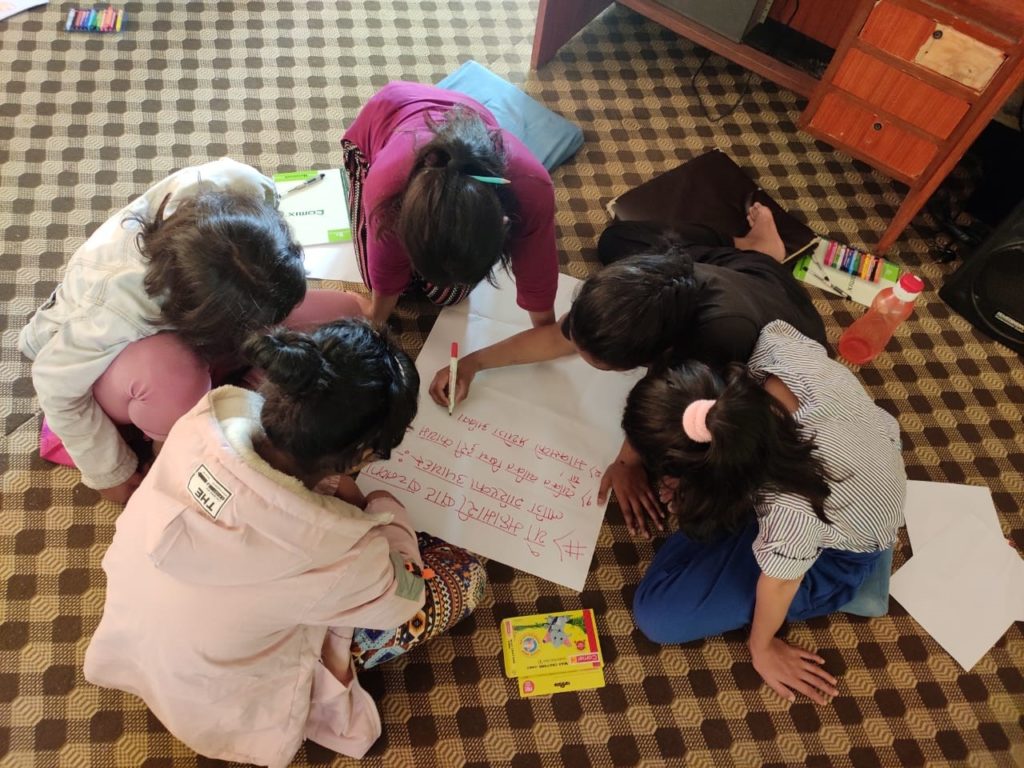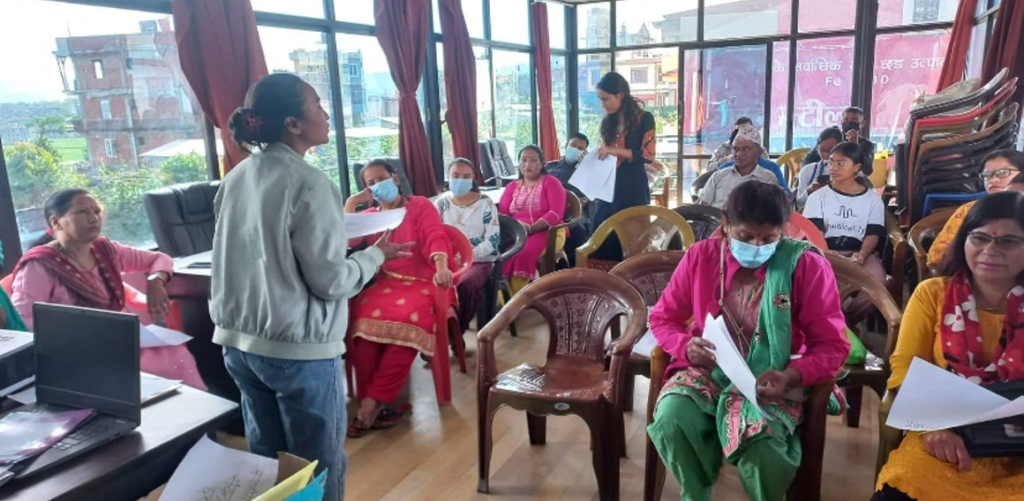
“The location is a bit tricky to find”
Okay. Nothing that google map cannot locate, I thought to myself, and headed for the destination. Google map on my mobile showed about one-hour-and-thirty-minute-ride. As we drove further and further away from the crowded Kathmandu streets, the greenery increased. Suddenly, the driver stopped in front of a big gate and informed me that we have reached our destination. I looked at my mobile; it had taken us two nearly two hours. I got off the car and headed towards the gate, but the driver stopped me. He told me that I should take the tiny alley that led to the potato field.
“Are you serious?” I asked.
“Yes Madam. Just walk 200 steps, and you will reach there,” the driver replied.
I headed towards the tiny trail that the driver showed. This beautiful trail passed through green potato field. The white flowers on the potato plants looked lovely. I reached my destination in no time. There were already many participants. We greeted each other. Before the program started, we chatted about the beautiful surroundings and the important landmarks of the area. I noticed a woman who was keenly listening to our conversation about hiking/trekking. In the rush to get back to the program I forgot to introduce myself.
I was there to attend the three-day residential training for the local representatives, officials, and Child Welfare Authorities of the six municipalities of Kavre District. The training program centered on Child Protection (CP), Trafficking in Person (TIP), and Victim’s Protection Act. I have been to similar trainings before but this particular training was of special interest to us. For the first time in our project, a TIP survivor was sharing her story in front of local representatives as part of the training.
Organizing events with TIP survivors and children are always sensitive. Great care is taken while holding such events. And most of such events with TIP survivors are closed door sessions in which camera or any other form of media is not allowed. It is very important that we respect their privacy and sensibility. Gaining their trust is an important aspect of working with the survivors. Their past experiences of being trafficked and exploited mentally, physically and emotionally can have a lasting effect on them, and they might feel isolated and psychologically manipulated. Therefore, narrating the stories with the survivors is a complex process that need special care and sensitivity.
The event proceeded as planned. Finally, it was time for the session on “the role of local level government in ensuring the rights of TIP survivors”. The facilitator invited a special guest to share her story with the participants. I looked across the hall and the lady next to me stood from her chair and moved towards the front. I was a bit nervous how this would go, but that it soon turned out that my nervousness was unfounded.
The lady started her speech by introducing herself. Her first sentence was–“I am here to share my story”. She spoke softly. At first, her voice was sounded shaky, but as she continued. The story begins some ten years ago, when she was trying to go abroad to work as a migrant laborer. She managed to get her passport and was ready to fly to one of the gulf countries for the work. Since, at that time, the Nepali state did not allow women to go abroad to work, particularly in the gulf countries, the broker flew her to India. She was supposed to fly to Middle East from there but instead she ended up in a brothel in Agra, India.
It was the time before the Machine-Readable Passport (MRP) was in use. The broker replaced her picture in the passport with someone else’s picture, and she flew in her stead. She on the other hand was sold off. After spending two years in the brothel, she escaped and returned home. Her homecoming was not as she had expected. Her family, especially her brothers, were afraid to bring her back home. They were afraid of the trafficker, who seemed to be very powerful. The police also would not register her case for the same reason.
It has been ten years since, now she is a licensed trekking guide. She is also a member of Shakti Samuha—a TIP survivor led organization in Nepal and have been advocating for the rights of TIP survivors. Her family has accepted her, but it was not an easy road.
She ended her story and looked around the hall, and continued to speak calmly. Her next statement was for the local representatives in the hall; she emphasized that the goal is to end trafficking in Nepal. In order to end trafficking, the first step is prevention, and prevention must start from the community itself. The community must jointly work in preventing girls and children from being trafficked. She further continued that the local government could play an important role in facilitating the reintegration of the TIP survivors back into their families. Due to the fear of stigma the family member of the TIP survivors boycott the trafficked person and cut ties leaving them without shelter and most importantly the emotional support and care to start all over again.
She also shared the prejudices that the police authorities have against TIP survivors and their negligence could bear serious consequences in the legal proceedings. She herself had to fight a lot even to register her case in police against the traffickers. In such cases she emphasized that the role of the local governments is crucial in ensuring that the TIP survivors are dealt with respect and the due process is completed by the police authorities. With that she ended her story and the session proceeded.
It was the last session for the training and we all departed our ways. I did not ask her anything further and made my way back to the tiny road through the potato field back to the car. As we drove back to Kathmandu I kept going back to her words and importance of the message she was trying to convey. The return and recovery path for TIP survivors are long and complex process. Even after years of returning and leading a “normal” life the stigma of being trafficked is a hard mold to break. According to a 2008 country-based study by the UN on human trafficking its vulnerabilities, and impact and Reports of Human Rights watch, chances of TIP survivors returning back to trafficking are high as the economic vulnerability of the families are still prevalent. The without addressing these vulnerabilities the vicious cycle of exploiting young children and girls cannot be broke. And the responsibility to end this vicious cycles lies within the family, communities, local leaders, government, civil society and individuals we are all different part of the puzzle if one piece is missing, it leaves a big gap in the whole picture.




